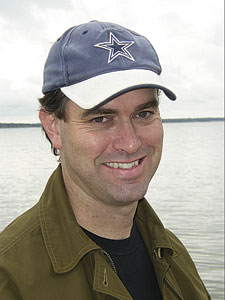 Cherrybrook Anglican Church began as a church plant from St Matthew's, West Pennant Hills a decade ago. It was established to reach out to the suburb's young families. It has now turned to the next stage of growth. As the Diocesan Mission moves its spotlight from church planting to community connection, Jeremy Halcrow asks Cherrybrook rector, the Rev Gav Poole, why strategic thinking about a church plant's ongoing connection to its community is so important as it matures.
Cherrybrook Anglican Church began as a church plant from St Matthew's, West Pennant Hills a decade ago. It was established to reach out to the suburb's young families. It has now turned to the next stage of growth. As the Diocesan Mission moves its spotlight from church planting to community connection, Jeremy Halcrow asks Cherrybrook rector, the Rev Gav Poole, why strategic thinking about a church plant's ongoing connection to its community is so important as it matures.
JH: Why do you now shun the title "church plant"?
GP: The church plant model was useful during the early stages of our church. Like everything that grows, there comes a stage when the church needs to stop thinking like a church plant and start thinking like a mature church. We have now left the "church plant" stage and moved onto the next.
JH: What's the difference?
GP: There are many differences. For instance, a church plant is focused. During the church plant stage we focused on young families. Now we target people of all ages.
A church plant has to think in minimalistic ways so as to not overstretch its resources. A mature church thinks of expansion.
Another thing is, a church plant needs help from others.
St Matt's financially underwrote us for a long time and helped in many ways, right down to lending their photocopier.
Now we are in a position where we can be the givers. For example, we have joined in partnership with a church in Barraba, in the Diocese of Armidale. We enjoy helping them out. It has required a change in our thinking.
JH: What made you take a new strategic direction?
GP: Three and a half years ago we started to put together a strategic plan for the church. This helped us to unite in the overall objectives of the church and to ensure we were all rowing in the same direction.
As we examined the history, we discovered that the church had experienced significant growth in its early years but had plateaued for about 4 years.
The pattern showed that the church could grow but something had to change if we wanted to grow further.
What was holding us back? We were still thinking like a church plant. That worked back then but now we need to turn out collective mind toward maturity.
Another thing was, we discovered that our primary goal, to reach out to the young families of Cherrybrook, was out of step with the demographics of the area. Young families no longer made up the bulk of the suburb. We have a large teenage population now. The suburb has aged.
JH: What practical changes has that involved?
GP: Probably the most significant change was to resource and develop our youth ministry. We employed Dan Wu to lead us in this. We are already seeing the results.
It was also important to move away from a pastor-centred model. For instance, someone complained that he had given the previous pastor a great promotion idea and that it hadn't been implemented. The question that immediately arose in my mind was, "Why was a promotion idea dependent upon the Pastor?"
We have now formed teams who have the responsibility and authority to implement initiatives. These teams are made up of people with common passions that form together to lead the church. People in our church have great passions. We want to encourage them to act on them. They report to the Wardens, Parish Council and myself. They have worked with varying success.
Each year Parish Council determines four to five main objectives that the whole church works toward. We call these "Next Steps". These have included planting congregations, reaching out to new communities and raising our awareness in the suburb.
JH: So, have you broken the plateau?
GP: It seems so. Our growth is now steady. In the past 4 years our average attendance has grown from 90 to 150. We have had a variety of people join from varying backgrounds " some from other churches and others who were not attending a church.
JH: Some may say this emphasis on strategies sounds more like a business than a church. Is that unfair?
GP: Our goal remains the same - To glorify God by proclaiming our saviour Jesus Christ. Our plans and strategies are simply ways of being wise about the resources God has given us. They also inform our prayers.
If we proclaim Christ and God has mercy on our area, we will see growth. We want to remove barriers and frustrations to growth so that the gospel can flourish.
When people think about gospel growth their minds go to programs and events. Southern Cross is full of these.
However, I believe we have to address our attitudes and culture that inform what we do. This helps us carry out our primary task which is to know Christ and make him known.






















